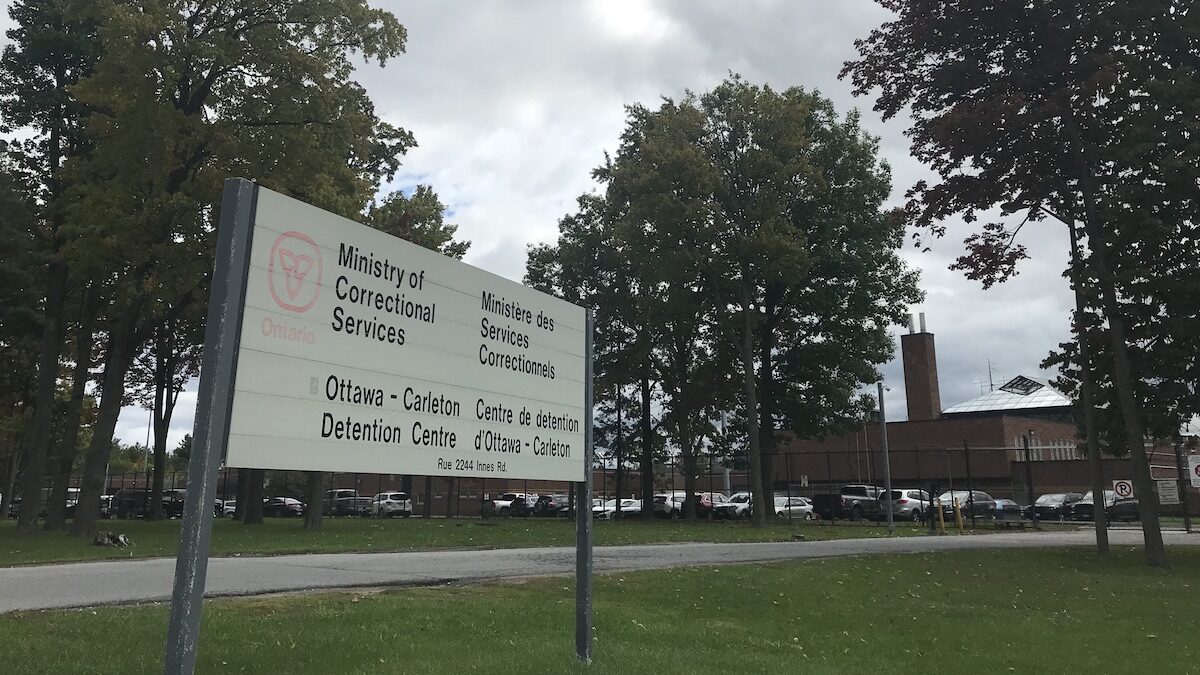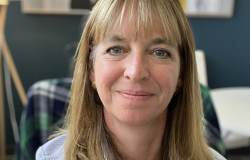The Ottawa-Carleton Detention Centre is in a legal spotlight during a lawsuit launched by an incarcerated man for alleged violations of his Charter rights.
Deepan Budlakoti claims to have suffered inhumane conditions and treatment in Ottawa’s main jail on Innes Road. Budlakoti alleges his treatment in the OCDC has harmed his physical and mental health, said University of Ottawa law professor Justin Piché.
“The systemic neglect of the constitutional protections that no one should be denied, even while imprisoned, is clear,” Budlakoti wrote in the Ottawa Citizen in July.
“He is raising a number of different issues that impact not only him, but all prisoners that are being held,” said Piché. Some of these issues include alleged instances of excessive force, segregation, lack of privacy in regards to medical care and food concerns.
Vanessa Fareau, a woman who was held at the jail in 2015, said she agrees that the conditions at OCDC are cruel. “There’s an overall disrespect for human life at OCDC,” said Fareau. “I’m happy that these issues are coming to light. I wish more people were made aware of it.”
“The systemic neglect of the constitutional protections that no one should be denied, even while imprisoned, is clear.”
Deepan Budlakoti, OCDC inmate, describing the conditions of the jail in an Ottawa Citizen article in July
Budlakoti is representing himself during the trial while he remains incarcerated.
“I’d say he’s doing about 95 per cent of the work on his own,” said Piché. Budlakoti is receiving some guidance from members of the academic community, but does not receive help collecting evidence or appearing in court, added Piché.
Fareau said she’s keeping up with the trial over Zoom. “I am beyond impressed that Deepan has done all this while being incarcerated with no legal background,” she said. “It’s very motivating. I wish I had done something like this years ago.”
Stacy Douglas, a law professor at Carleton University and close friend of Budlakoti, said he has faced many barriers bringing his case forward.
“As a person who is currently incarcerated, there are so many risks,” said Douglas. “I mean … it’s not like the guards (at the prison) don’t know what’s going on.”
Ontario jails have a history of intimidation directed at those who challenge the system, said Fareau. “I know what happens when you try to bring light to the conditions,” she said.
Fareau said she saw people at OCDC experience difficulty when trying to speak to a representative about their rights. “It’s a blue form you can send to contact a jail mediator. If there was a search and you had one of those blue forms, forget it. They would throw all your stuff away.”
Fareau attempted to file a lawsuit against Quinte Detention Centre in Napanee while she was detained there, she said. “After I called a lawyer, they started telling all my visitors that I didn’t want any visits at the moment.”
‘Specifically targeted’
Douglas said she has witnessed a comparable withholding of privileges with Budlakoti. “One of the things I certainly noticed with Deepan is that he feels he’s been specifically targeted,” said Douglas. “His mail goes through and some things don’t get to him.”
“I can’t imagine what kind of repercussions he’s facing every time he leaves the court house and goes back to OCDC,” said Fareau.
This is not the first time Budlakoti has challenged the system, said Douglas. Budlakoti fought to be reinstated as a Canadian citizen after his citizenship was revoked in 2012.
Budlakoti’s parents were working in the Indian embassy around the time of his birth in October 1989, said Douglas. His passport was granted in error because there is a subsection of the Citizenship Act that states if your parents are diplomatic staff at the time of your birth you are not a Canadian citizen, said Douglas.
Budlakoti challenged this by claiming his parents were not employed at the Indian embassy on the exact date of his birth, which was confirmed by the records kept by the embassy, said Douglas.
Despite being born in Ottawa and never having lived anywhere else, Budlakoti did not regain Canadian citizenship in 2014, said Douglas.
“The Canadian state has decided it is reasonable to hang a person’s entire life on a difference of opinion,” said Douglas.
Without citizenship status, Budlakoti could not access resources or get a job. He would go on to be charged for selling firearms in 2017, said Douglas. “It’s surely not surprising that, when someone is not given the legal right to participate in society, they won’t be able to participate in society,” said Douglas.
Budlakoti has been incarcerated at OCDC for four years, but has not yet been convicted of the charges that brought him there, said Douglas.
Budlakoti was charged with 18 firearms charges after allegedly selling ammunition, machine guns and hand guns to an OPP informant between June 30 and Oct. 5, 2017, according to the Ottawa Citizen.
“He’s told me both in person and on the phone about the horrendous conditions, and of course I’ve seen it on his body when I go to visit him at OCDC,” said Douglas. “His condition… he’s lost a lot of weight. He looks very different than he did before he went in the prison.”
Inadequate food standards are among one of the many violations that Budlakoti has alleged in his lawsuit, said Piché. Budlakoti has claimed in court that he was not given food that meets his medical and religious halal specifications. “Folks who are behind bars are often living with medical issues more so than the general population, so issues around diet are extremely important,” said Piché.
“He’s told me both in person and on the phone about the horrendous conditions, and of course I’ve seen it on his body when I go to visit him at OCDC.”
Stacy Douglas, Carleton University Law Professor
As a vegetarian, Fareau said OCDC very rarely provided meat-free options and she would sometimes have to eat a packet of crackers for dinner.
“It’s really unfortunate that we can’t do better for people who are incarcerated,” said Douglas. “They have no other option than to eat what is put in front of them.”
Budlakoti claimed in court that his treatment by staff members at OCDC is a main concern. “Everything is an annoyance to them,” said Fareau. “I would ask a simple question and be cursed at.”
“A lot of people are coming from serious trauma. To treat people like that, period… it’s just not right,” said Fareau. “They should be the calm for people’s storm but instead they’re the extra hurricane.”
“My physical and mental health has eroded. This makes me wonder how many more individuals aren’t receiving adequate care in this dungeon,” Budlakoti wrote in Ottawa Citizen, referring to the lack of medical care in OCDC, which is another main concern in the ongoing trial.
A report released in March 2015 by the OCDC Community Advisory Board included recommendations to deal with the inadequate living conditions of detainees, said former Community Advisory Board member Rebecca Jesseman.
The recommendations included addressing use-of-force issues by requiring more frequent investigations of OCDC staff, improving food quality and implementing better mental health treatment, said Jesseman. The Ontario Ministry of the Solicitor General website stated that OCDC staff did not feel equipped to deal with the mental health concerns of the incarcerated.
“OCDC was just coming out of a period of staff shortages,” said Jesseman, referring to OCDC mandating an increase in staff hiring in 2013. “There were continuing challenges with the institution itself being an aging facility and upkeep to continue to meet the needs of the staff and inmates.”
The Community Advisory Board was disbanded in June ending routine assessments of the detention centre, said Jesseman.
OCDC Task Force
In response to the report made by the Community Advisory Board and ongoing complaints by those held at the jail, OCDC created a task force in 2016 to address the claims of “unacceptable” conditions, said the Ministry of the Solicitor General website.
The task force primarily addressed concerns of overcrowding in the jail and “long-term solutions to improve the health and safety of inmates and staff,” the ministry stated.
The task force also focused on improving access to health care for those who are incarcerated, which was one of the failings alleged by Budlakoti in the ongoing trial. “All new correctional officer recruits now receive mental health training,” said the ministry.
Budlakoti says access to medical care and mental health treatment continue to be issues at the detention centre. “There’s still only one mental-health nurse for hundreds of prisoners in OCDC,” said Budlakoti in his July article in the Citizen.
“I think it is an important case to follow. It has important ramifications,” Piché said of Budlakoti’s ongoing challenge of the Innes Road facility. “If Deepan wins, it has the potential to usher in a number of reforms to reduce the harms of imprisonment.”
Budlakoti’s final court appearance is Oct. 1 from 10 a.m. to 4 p.m., according to the Criminalization and Punishment Education Project website, where the Zoom link to the court proceedings is provided.





The Ottawa-Carleton Detention Centre has despicable care for inmates. I was imprisoned there before my trial as a type 1 diabetic, and the medical staff had decided I didn’t need long acting insulin at all. In less that 24 hours I developed diabetic ketoacidosis, and every time I saw a guard or medical staff I told them I had diabetic ketoacidosis, and they ignored me completely for a month. I eventually had a heart attack due to ketoacidosis, and I was very lucky to have gotten to a hospital where it could be treated. The lieutenant at the time also told my cell mates what my crime was, and he encouraged them to beat me to a pulp after my heart attack since taking me to the hospital was an inconvenience.
My son has been incarcerated at Ottawa Carleton Detention Center (OCDC) since last April 2022.
He has been treated poorly and has been locked in his cell away from the population for punishment.
He stayed with a follow inmate one day and refused to leave his side that afternoon . The guards were not providing this person with his insulin at meal time. They were taunting this poor fellow with name calling threatening him with physical violence and making jokes at his expense and they would lock him away.
During this time my son had been watching and witnessed the cruelty of the guards there. My son stayed with the diabetic person who was clearly in danger. The guards told my son to get back to his cell, but he refused to do so. Now he to was under physical threat and confinement. But my son stayed with the diabetic for hours with constant threat of getting a beating and solitary confinement. All the while my son stayed at his side. Finally after many hours the two individual’s (bullies) made a call to a doctor as that diabetic was clearly going into shock.
The call was placed just before midnight. When my son witnessed the Dr. giving the poor man his insulin only then did he leave his side and go back to his cell.
Now my son has been segregated, locked away and more charges laid on him. He is not in a safe there because he stood up for this person in a medical distress.
He has been separated from other inmates now and is fed poor food and no one has been allowed to visit him. Letters posted to him , well he is told what to letter says, but not allowed to read them. He can’t even send a letter That on it’s own is abuse.
His dad
My son has spent a lot of time at innes rd he has made a lot of bad choices ,and because of being thrown in the hole for months on end is already fragile mental health has deteriorated my son now hears voices he talks to himself it is horrible then when he gets out of confinement he has to fight for his life every other month years ago there was no beds he slept on the floor in the showers he has been treated like a rabid dog.you have no human rights when you are held at innes road.